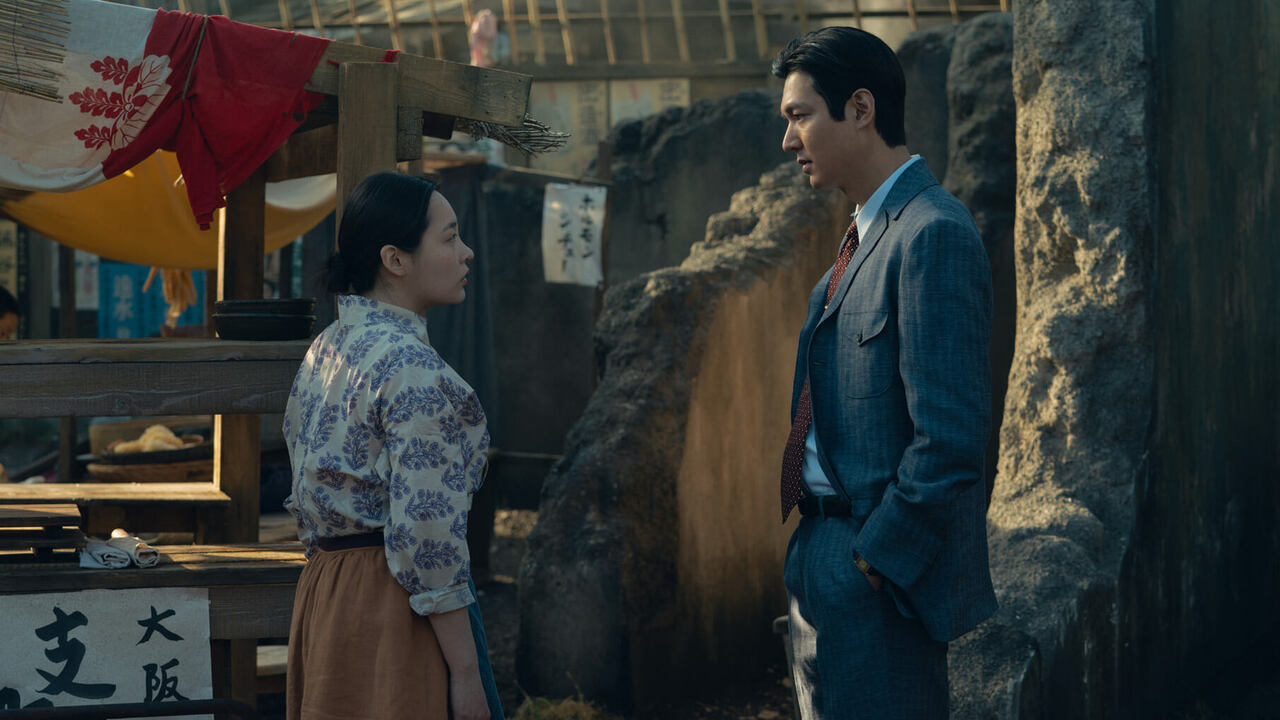
In Pachinko's Chapter Fourteen, the sixth episode of Season 2, the narrative dives deeper into the repercussions of survival, ambition, and legacy, continuing to unfold in the aftermath of war. This episode, in many ways, stands as a crossroads for its characters, particularly Hansu and Sunja, each facing different but interconnected consequences of their choices.
The episode's pacing strikes an intricate balance between the personal and the political, as it threads Hansu’s rise in the criminal underworld with Sunja’s steadfast struggle in post-war Korea. Hansu is now at the peak of his power, but his wealth, as it is clear in this episode, has come at a heavy price. The duality of his character is beautifully highlighted—he is both a protector and a predator, striving for control, yet continually haunted by what he’s lost along the way. The episode excels in showing his emotional vulnerability beneath the veneer of his success, subtly hinting at the loneliness that power brings. The strong writing continues to portray him as a morally complex character.
Sunja’s arc is equally powerful. The show has always excelled in portraying her resilience, but this episode dives further into the cost of survival. Sunja, still navigating a life of hardship and family tensions, stands as a symbol of endurance against seemingly insurmountable odds. There’s a quiet strength in her character that contrasts with Hansu's more aggressive pursuit of power, and this contrast is what gives the episode its emotional depth.
The cinematography also deserves special mention. Every shot seems to serve a dual purpose—capturing both the beauty of the world and the darkness within it. The post-war landscapes are hauntingly desolate, perfectly reflecting the characters' inner turmoil. Pachinko continues to maintain its distinctive visual style, with a color palette that shifts depending on the character focus—Hansu’s world is darker, and more ominous, while Sunja’s world, though bleak, is filled with moments of hope and warmth. The music, too, is carefully woven into these scenes, accentuating the drama without overpowering it.
While the episode does a commendable job of portraying the psychological and emotional complexities of its characters, it sometimes feels like the pacing of certain subplots—particularly those involving supporting characters—is slightly sluggish. The show has so much to juggle with its sprawling cast, and in this episode, some side stories feel like they’re treading water, awaiting future episodes for more significant developments. The pacing, at times, loses momentum during scenes that feel a bit stretched out, particularly when delving into the quieter moments of reflection, which, although beautifully acted, occasionally slows down the narrative drive.
Moreover, while Hansu's arc is compelling, the exploration of his criminal rise is somewhat conventional. Given the show's ability to subvert expectations, his storyline feels more predictable compared to the intricately woven tales of the other characters. The episode touches on the sacrifices he's made, but it doesn't quite delve into the intricacies of his criminal empire, leaving parts of his backstory feeling incomplete or underexplored.
The performances, as usual, are a highlight. Lee Min-ho continues to bring layers to Hansu, capturing his internal struggles through subtle expressions and body language. His portrayal of Hansu’s inner conflict is one of the driving forces of the episode. On the other hand, Kim Min-ha as Sunja offers a restrained but deeply affecting performance, portraying both the quiet sorrow and unyielding strength of her character. Their performances, alongside the rest of the ensemble, ground the show in a reality that feels intimate despite its grand historical scope.
Thematically, this episode deals heavily with the concept of legacy. Both Sunja and Hansu are trying to secure a future for their children, albeit through very different means. Hansu’s ruthless approach contrasts with Sunja’s quieter, more enduring form of resistance. This exploration of parental sacrifice and the lengths one will go to secure the next generation’s survival is one of Pachinko’s most poignant themes, and it’s woven skillfully into this episode.
Pachinko's Chapter Fourteen continues to build on the strengths of its previous episodes, offering viewers a rich tapestry of emotional and moral complexity. It portrays the personal costs of survival and ambition, against the backdrop of larger historical forces. While the episode does occasionally falter in its pacing and could have expanded on certain narrative threads, it remains an engaging, visually stunning chapter in the series.
The blend of personal struggles with broader socio-political themes ensures that Pachinko remains one of the most compelling dramas of the year. Episode 6, while not without its flaws, is a strong entry that deepens the emotional investment in its characters. The stage is set for an intriguing and potentially explosive continuation of the season.
Final Score- [8/10]
Hi Everyone, after a due consideration, we have decided that we will be open for donations to help us in managing our website. We will be greatful for any kind of amount we receive. Thanks!
— Midgard Times 🎬 (@Moviesr_net) January 4, 2026
PayPal- [email protected] pic.twitter.com/DlNNz5Npm5
Get all latest content delivered to your email a few times a month.
Bringing Pop Culture News from Every Realm, Get All the Latest Movie, TV News, Reviews & Trailers
Got Any questions? Drop an email to [email protected]